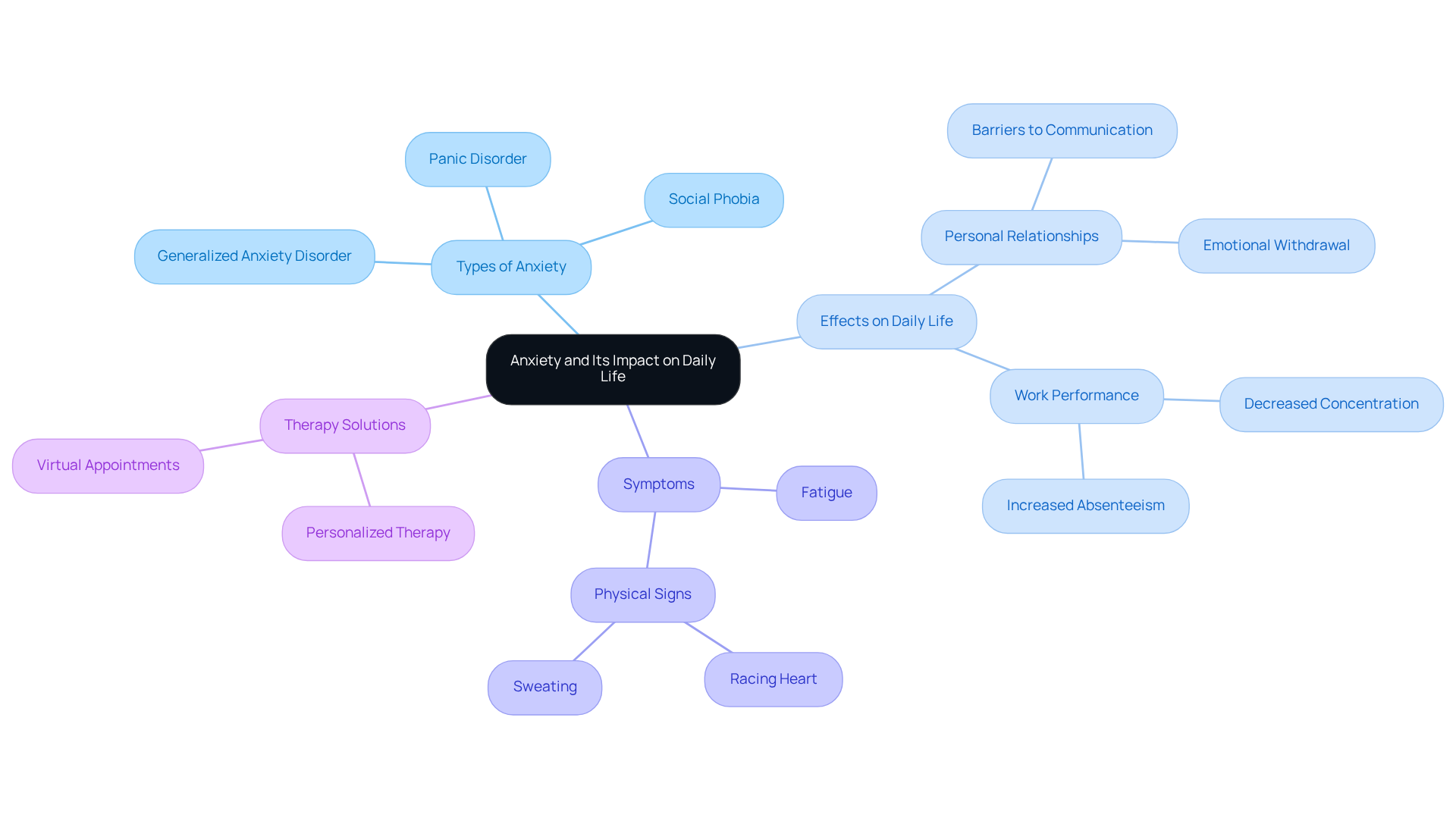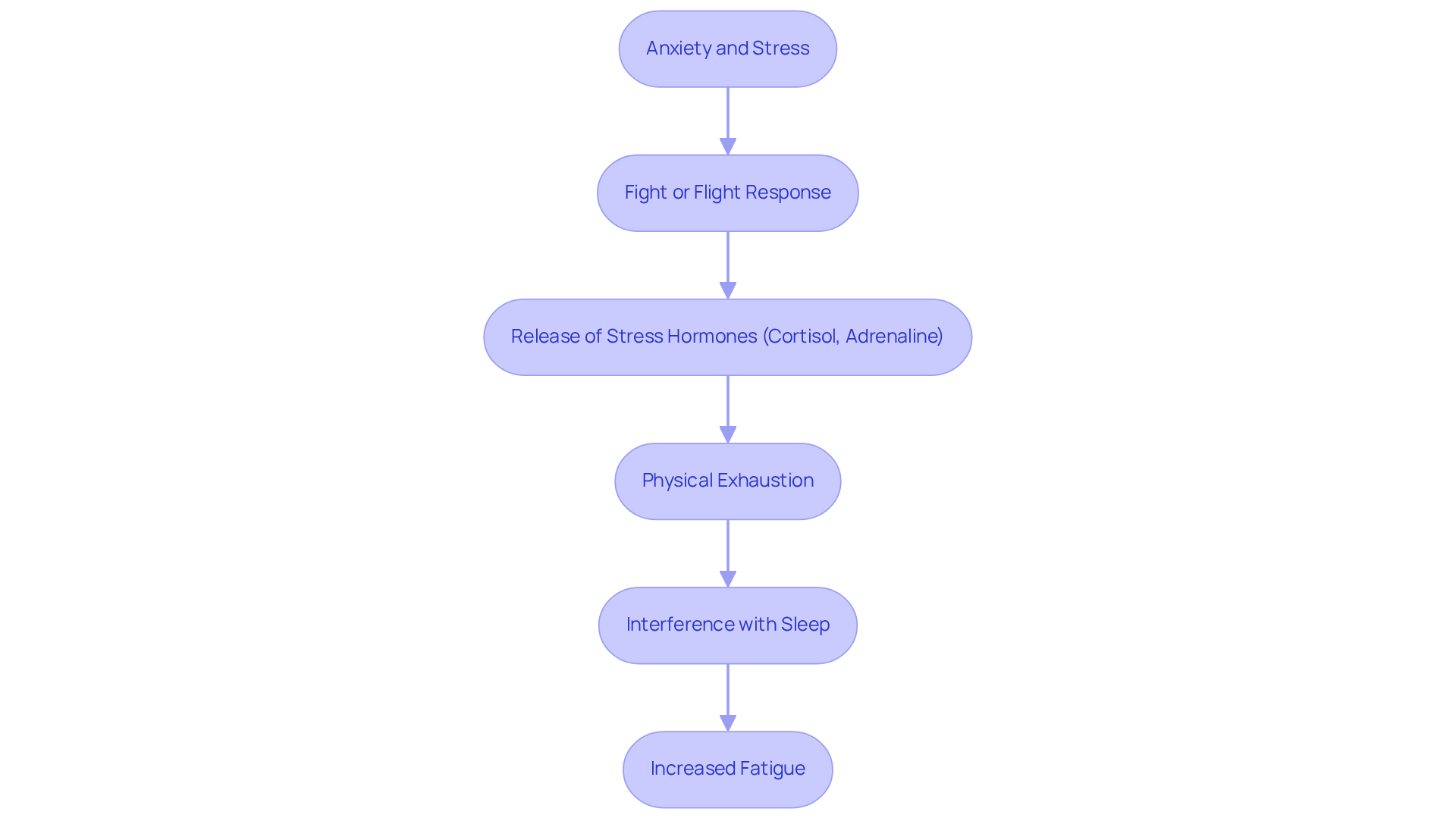Overview
Anxiety can indeed lead to fatigue. The stress associated with anxiety triggers the release of hormones like cortisol and adrenaline, which can result in physical exhaustion and disrupted sleep cycles.
Have you ever felt overwhelmed by persistent worry? This emotional drain can interfere with daily activities, leaving you feeling depleted.
Recognizing these symptoms is crucial, as they are a common reaction to stress. Understanding this can empower you to seek appropriate support and effective management strategies.
Remember, you are not alone in this journey.
Introduction
Anxiety often lurks in the shadows, a silent yet powerful force that can disrupt daily life and drain energy levels. Have you ever felt overwhelmed by worry, only to find yourself battling fatigue? This raises a critical question: can anxiety truly be the culprit behind that overwhelming tiredness?
In this article, we will gently explore the intricate relationship between anxiety and fatigue, examining how stress affects both the body and mind. Together, we will uncover practical strategies to reclaim your energy and well-being.
What if understanding this connection could unlock the key to a more vibrant, fulfilling life? As we delve deeper, let’s consider how recognizing these patterns can lead to a path of healing and renewal.
Define Anxiety and Its Impact on Daily Life
Many people wonder if anxiety can cause fatigue, as it is a natural response to stress often characterized by feelings of worry, fear, or apprehension. It can manifest in various forms, such as generalized anxiety disorder, panic disorder, and social phobia. The effects of stress on daily life can be profound, significantly impacting personal relationships and work performance. For instance, have you ever felt your heart race or found yourself sweating due to overwhelming worry? These physical signs can further exacerbate distress and lead to avoidance behaviors. Statistics reveal that nearly 50% of individuals diagnosed with depression also experience a related disorder, underscoring the interconnectedness of these conditions.
At The Emerald Couch, we understand that the journey to wellness is unique for each individual. Our personalized therapy solutions, including virtual appointments, are designed to address the specific needs of trauma survivors, especially those facing postpartum challenges. Many clients begin to feel better or notice improvements within 4 to 6 weeks of starting therapy, as we collaboratively set goals and determine a pace that suits you best. This is particularly beneficial for overachievers who often struggle to prioritize their own needs amidst the demands of work and family life.
In personal relationships, stress can create barriers to effective communication and emotional closeness. Individuals may withdraw or become irritable, leading to misunderstandings and conflict. In the workplace, stress can hinder concentration and productivity. Studies indicate that approximately 31.1% of U.S. adults experience a mental health disorder at some point in their lives. This can result in decreased job performance and increased absenteeism, further compounding stress.
Real-world examples illustrate these challenges: a busy professional may find it difficult to meet deadlines due to overwhelming worry, while a parent may struggle to engage with their children because of persistent feelings of dread. Identifying these symptoms is essential, as it signifies the first step toward understanding how stress can lead to the question of whether anxiety can cause fatigue and interfere with daily activities, impeding personal development. By recognizing the presence of unease, individuals can begin to seek appropriate support and interventions, paving the way for recovery and improved well-being at The Emerald Couch.

Explore the Mechanisms Linking Anxiety to Fatigue
The intricate connection between stress and tiredness leads to the question: can anxiety cause fatigue? When stress arises, our bodies react by engaging the 'fight or flight' response, initiating the release of stress hormones like cortisol and adrenaline. These hormones prepare us to confront perceived threats; however, their prolonged presence can lead to significant physical exhaustion, leading us to wonder, can anxiety cause fatigue? Have you ever felt this way? Many, including individuals like Client Z, have shared experiences of intense exhaustion due to persistent nightmares and the emotional burden of stress, often feeling a lack of energy during the day and even humiliation in social contexts.
Moreover, worry can interfere with our sleep cycles, leading to insufficient rest and raising the question of whether can anxiety cause fatigue and worsen feelings of tiredness. Managing persistent anxious thoughts can anxiety cause fatigue, as this mental burden further depletes our emotional energy and leaves us feeling overwhelmed. As health experts observe, exhaustion is a sign of stress that can obstruct our personal aspirations and satisfaction. Micah Abraham emphasizes that exhaustion from stress is frequently challenging to comprehend, yet it is a typical experience for many.
Understanding these mechanisms is essential for those dealing with anxiety-related exhaustion, particularly in exploring how can anxiety cause fatigue. Recognizing that tiredness is a common reaction to stress, rather than a personal flaw, can empower individuals to seek appropriate assistance and techniques for managing their mental well-being. Remember, you are not alone in this journey.

Implement Strategies to Manage Anxiety-Induced Fatigue
To understand how to manage fatigue, it's important to explore whether anxiety can cause fatigue, requiring a multifaceted approach that includes lifestyle adjustments, therapeutic practices, and self-care strategies. Have you ever felt overwhelmed by your past? Here are several impactful methods to consider:
- Establish a Routine: Creating a daily schedule fosters structure and predictability, which can significantly reduce stress levels. Studies show that routines assist people in adapting to familiar patterns, decreasing worry about the uncertain.
- Practice Mindfulness and Relaxation Techniques: Engaging in mindfulness meditation, deep breathing exercises, or yoga can calm the mind and diminish stress. Mindfulness practices have been shown to positively influence brain activity related to emotion regulation, enhancing overall mental health.
- Prioritize Sleep Hygiene: A restful sleep environment and a consistent sleep schedule are crucial for improving sleep quality, which in turn combats fatigue. Quality sleep is essential for managing stress and enhancing emotional resilience.
- Engage in Physical Activity: Regular exercise releases endorphins, enhancing mood and energy levels while simultaneously decreasing stress. Short bursts of high-intensity interval training (HIIT) can be particularly effective for those with busy schedules, providing without requiring extensive time commitments.
- Seek Professional Support: Therapy, especially trauma-informed care offered at The Emerald Couch, equips individuals with coping strategies tailored to their unique experiences. Our collaborative treatment planning process ensures that your therapy is personalized to meet your specific needs, whether through face-to-face counseling or telehealth options. Therapeutic methods like EMDR and Cognitive Processing Therapy (CPT) are also accessible to assist in addressing trauma and stress effectively.
- Limit Stimulants: Reducing caffeine and sugar consumption can help stabilize energy levels and lessen stress spikes, promoting a more balanced emotional state.
By implementing these strategies, individuals can effectively manage their anxiety, as anxiety can cause fatigue and mitigate its impact on energy levels. At The Emerald Couch, we specialize in supporting trauma survivors, including overachievers who may feel overwhelmed and burnt out. Let us help you navigate your challenges and foster a healthier, more balanced life.
Conclusion
Anxiety transcends mere emotional turmoil; it deeply influences physical health, often resulting in fatigue. Recognizing the complex interplay between anxiety and exhaustion is vital for anyone aiming to enhance their mental health. By understanding that anxiety can sap energy and disrupt daily routines, individuals can take meaningful steps toward recovery and improved well-being.
This article sheds light on various dimensions of anxiety, from its definitions and effects on personal relationships to the physiological links that connect it to fatigue. Key strategies for managing anxiety-induced fatigue include:
- Establishing routines
- Practicing mindfulness
- Prioritizing sleep
- Engaging in physical activity
- Seeking professional support
These methods empower individuals to reclaim their vitality and elevate their overall quality of life.
Ultimately, addressing anxiety and its accompanying fatigue goes beyond merely alleviating symptoms; it involves nurturing resilience and well-being. By embracing effective strategies and reaching out for support, individuals can navigate their challenges, paving the way for a healthier and more balanced life. Have you ever felt overwhelmed by your emotions? Remember, taking that crucial first step toward understanding and managing anxiety can lead to profound improvements in both your mental and physical health.
Frequently Asked Questions
What is anxiety and how does it impact daily life?
Anxiety is a natural response to stress characterized by feelings of worry, fear, or apprehension. It can significantly impact daily life by affecting personal relationships and work performance, leading to issues like miscommunication, irritability, and decreased productivity.
Can anxiety cause fatigue?
Yes, anxiety can lead to fatigue as it creates physical symptoms like a racing heart and sweating, which can exacerbate distress and lead to avoidance behaviors.
What are some common forms of anxiety disorders?
Common forms of anxiety disorders include generalized anxiety disorder, panic disorder, and social phobia.
How prevalent are mental health disorders among U.S. adults?
Approximately 31.1% of U.S. adults experience a mental health disorder at some point in their lives.
How does stress affect communication in personal relationships?
Stress can create barriers to effective communication and emotional closeness, leading individuals to withdraw or become irritable, which can result in misunderstandings and conflict.
What are the benefits of therapy at The Emerald Couch?
The Emerald Couch offers personalized therapy solutions, including virtual appointments, tailored to the specific needs of individuals, especially trauma survivors. Many clients begin to feel better within 4 to 6 weeks of starting therapy.
How does anxiety affect workplace performance?
Anxiety can hinder concentration and productivity, resulting in decreased job performance and increased absenteeism.
What is the first step towards addressing anxiety and stress?
Identifying symptoms of anxiety and stress is essential, as it signifies the first step toward understanding and seeking appropriate support and interventions for recovery and improved well-being.




